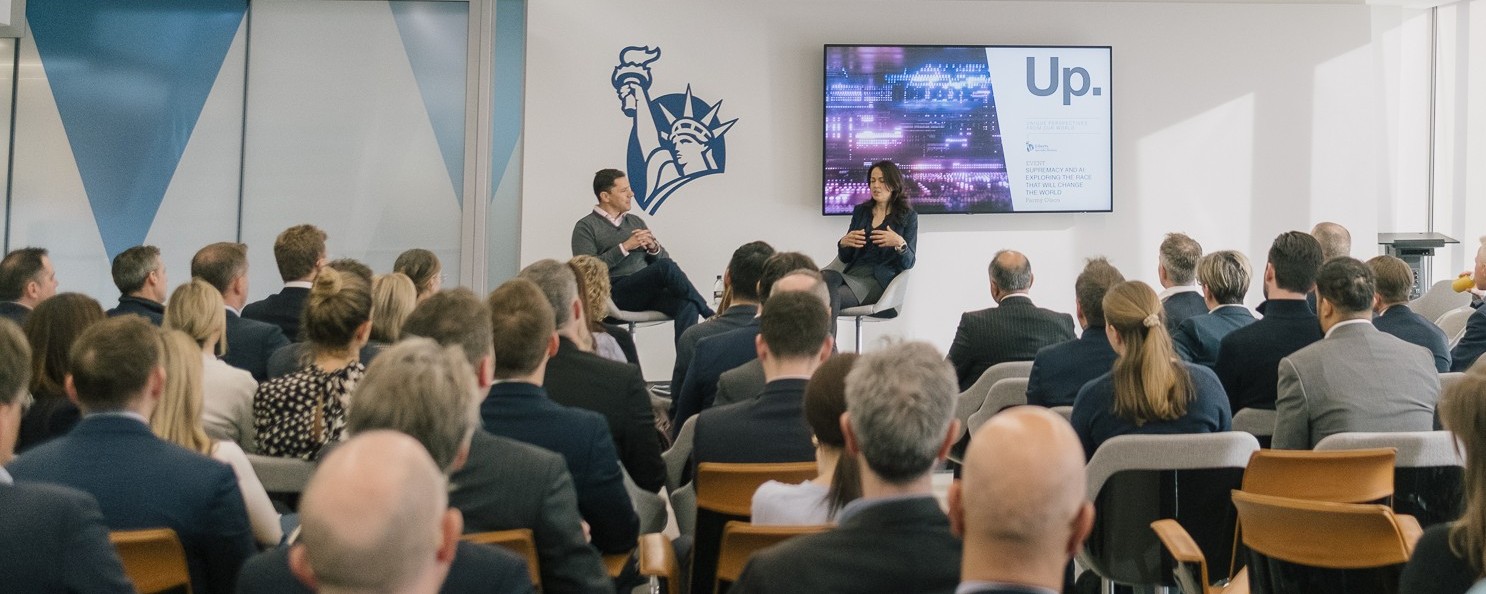Parmy Olson is a celebrated technology journalist and author who, for the last two decades, has followed and written about the latest developments in technology. Her book: Supremacy: AI, Chatgpt, and the Race That Will Change the World, which I strongly recommend, won the Financial Times and Schroders Business Book of the Year Award in 2024, and I was delighted to welcome Parmy as a guest at our most recent Unique Perspectives event.
Curiously, when Parmy began writing about AI 14 years ago, her editors were resistant and questioned its significance. Undeterred, Parmy spent three years in San Francisco, immersing herself in Silicon Valley and interviewing its luminaries, billionaire founders and capital backers. Eventually, with the arrival of ChatGPT and Silicon Valley’s emergence as the “Roman Empire of tech”, her foresight and belief in AI’s potentially huge significance was vindicated. Her intrigue in these figures informs much of her work, as she says: “The people building this stuff are literally seeing the future. They're sometimes living in the future.”
A terrible dystopia or beautiful utopia?
Having watched AI come of age, I was intrigued to know if Parmy is an optimist or a pessimist regarding its future? “It’s both. With AI there’s no terrible dystopia or beautiful utopia,” she explained, adding: “We get benefits, but we also pay a price. For example, social media, which started as a great way to stay connected, has led to less face-to-face interaction.”
Since Parmy’s book was published, Chinese start-up DeepSeek launched its AI assistant, which claims to prioritise research over revenue, in contrast to the dominant incumbents. This, Parmy suggests, could possibly be a new, more positive direction for AI, with DeepSeek making its blueprints open source, i.e. publicly available for anyone to access, use, modify and distribute. She added: “This not only challenges Silicon Valley's dominance but also signals the potential for decentralised AI innovation. My hope is this is good news given AI’s development has been limited to a couple of large US corporations in recent years. Now we're starting to see the possibility of a more dynamic market, because if DeepSeek can do it, maybe a startup in Europe or elsewhere can too.”
Parmy makes a further interesting observation that AI developers are now constrained having run out of data as the whole of the internet has been mined. “That’s why the buzz word in AI right now is distillation, which involves finding ways to make existing models more efficient,” she says, suggesting Silicon Valley engineers will now be poring over DeepSeek’s blueprints to do just that.
The role of regulation
With technological innovations such as AI, the rate of human advancement is exponentially faster than it was even 15 years ago. “Now it's almost impossible to keep up”, she says, highlighting the urgent need for robust and thoughtful regulatory oversight.
So what does good regulation look like? “It has to be fast and it can't target the technology, it has to target the use of the technology and the impact of the technology,” Parmy asserts. While she concedes that good regulation takes time, she also says this is already happening and praises the UK’s efforts, suggesting it could play a leading role. “The UK does really great tech regulation. The Online Safety Act, while controversial, is a very smart piece of legislation as it builds on health and safety law, framing the responsibility of social media companies in terms of their duty of care to users.”
She is also upbeat about the European Union's forthcoming AI Act, saying: “I have a lot of hope for that in setting rules to ensure AI technologies are developed and used in a safe, ethical, and transparent way.”
AI: the societal trade-offs
When asked to consider how AI might change the lives of average citizens over the next five to 10 years, Parmy says: “The pessimistic view suggests AI-assisted workers will be under pressure to be much more productive. For example, as a columnist, I might be expected to write four rather than two columns a week. And I might be overseeing multiple AI agents rather than doing the creative work myself.”
And the optimistic view?
“AI could just as easily enable people to focus on higher-level, more enjoyable work, possibly leading to fewer work hours and even increased wealth, as AI boosts productivity and creates new value.”
AI in insurance
We have for many years calculated the probable frequency and severity of potential events by analysing past data and statistics so was interested to know, is there a way of applying AI to our industry?
“AI models are primarily trained on text, so they’re great at understanding language but not so good with mathematical problems. However, very recently there’s been a shift toward reasoning models, which process a question, generates an answer, then evaluates and refines that answer based on their knowledge base. They do this in milliseconds and the results are much more accurate, especially with maths calculations. This advance means AI models are becoming potentially capable of dealing with the types of calculations and decision-making that are core to the insurance industry.”
With AI limited by computational capacity, might quantum computing be powerful enough to truly impact the industry? “Developers realised three years ago that increasing data, computing power and parameters makes AI more human-like, accurate, and versatile. The race is now on in Silicon Valley between companies competing for powerful graphics processing units to build the largest AI systems.”
This suggests we’re moving toward a future where AI combined with quantum computing could provide the computational power needed to significantly transform industries like insurance.
AI is already making significant strides in the insurance industry, yet we have only begun to explore its full potential. The advantages are clear and impactful. In a people-orientated marketplace, AI and automation free up valuable time, allowing us to focus more on our client and broker relationships. Additionally, vast amounts of historical data can now be analysed in seconds, unlocking tremendous opportunities for insight, innovation, and better risk management. Given that the insurance sector is fundamentally reliant on data and statistics, these benefits have the potential to be truly transformative. In fact, insurance stands as one of the industries with the most to gain from the careful use of AI.

